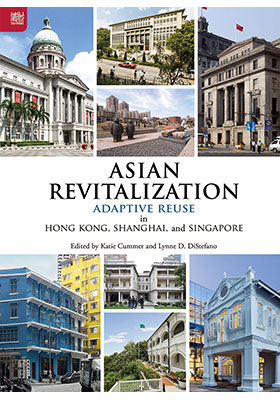Asian Revitalization
Adaptive Reuse in Hong Kong, Shanghai, and Singapore
(亞洲活化建築:香港、上海及新加坡的活化再用)
ISBN : 978-988-8528-55-4
January 2021
248 pages, 8″ x 11″, 108 b&w illus. and 39 tables
Leave your email so we can notify you when the book is available.
Ebooks
Also Available on
Adaptive reuse refers to reusing an old building for a purpose other than which it was originally built or designed. This conservation approach has become increasingly popular around the world. However, there are few publications that focus on its application in Asia. This book fills this gap by looking at both unique and shared aspects of adaptive reuse in three Asian urban centers: Hong Kong, Shanghai, and Singapore. Building on government policy documents and extensive field work, this book contextualizes adaptive reuse in each city and reveals the impetus behind a wide range of projects from revitalization in Hong Kong, commercial development in Shanghai, to community building in Singapore.
The introductory chapter sets adaptive reuse within an international perspective, noting salient differences and similarities between Asia and other parts of the world. It also anchors the discussion within a regional perspective, focusing on the similarities and differences between Hong Kong, Shanghai, and Singapore. Each of the following four essays addresses a specific topic about adaptive reuse, including its relationship to urban development and sustainability, how it benefits heritage buildings, and how it reveals best practices in heritage conservation in Asia. The subsequent three essays, one for each city, supplemented with timelines, set out a clear framework for understanding the city-specific case studies that follow the essays. Afterwards, fifteen representative projects across the three cities are presented as in-depth case studies. The pairing of essays and case studies provides a detailed understanding of each city’s approach to adaptive reuse in the twenty-first century; a time when the need for sustainable development solutions are at the forefront. Intended for classroom use and professional readership, this book will be of considerable value in Asia, as well as elsewhere, providing material for stimulating and worthwhile discussion.
“Asian Revitalization is a highly practical and accessible volume on the long-established conservation practice of adaptive reuse in East Asia. Its focus on real-life issues, examples, and challenges posed by revitalization programs in the region is extremely relevant to researchers and practitioners in architectural conservation, urban design, and urban studies.” —Miles Glendinning, University of Edinburgh, Scotland
“This is a superb, well-documented, and original book written by some of the best-known and highly respected authors in the field of heritage conservation. The carefully examined case studies illustrate a wide variety of solutions that highlight the work of some of the best minds of the next generations.” —Alastair Kerr, University of Victoria, Canada
“This is a most interesting set of essays, informative and thought-provoking. The best way to save any heritage building is by keeping it in beneficial use and how to achieve this in a sensitive manner is what these essays are about. They should be vital reading for anyone considering an adaptive reuse project in Asia.” —Michael Morrison, Purcell, UK
“With cultural heritage firmly ensconced in the global development agendas of the United Nations, this well-grounded volume draws upon the experience of Hong Kong SAR, Shanghai, and Singapore to demonstrate to scholars and practitioners alike how historic properties can be sustained through savvy adaptive reuse in the midst of tremendous urban redevelopment pressures.” —Montira Horayangura Unakul, UNESCO Bangkok, Thailand




